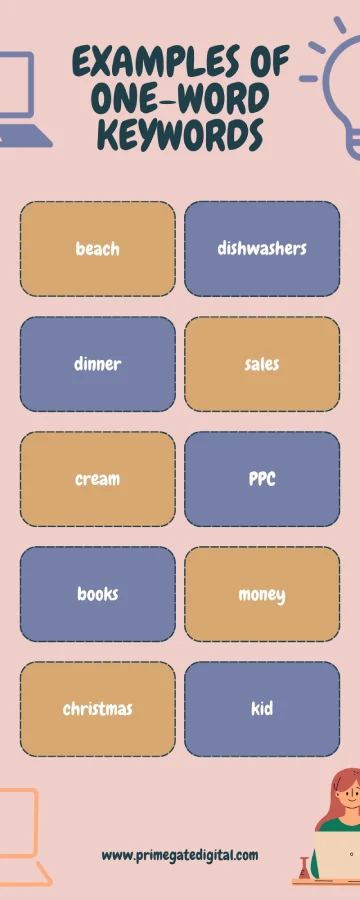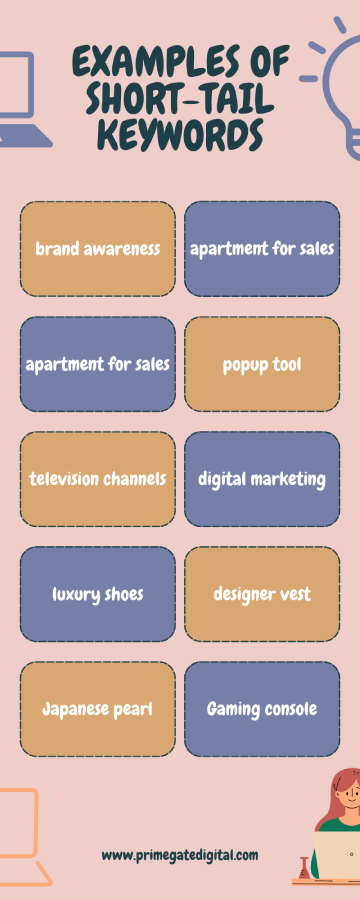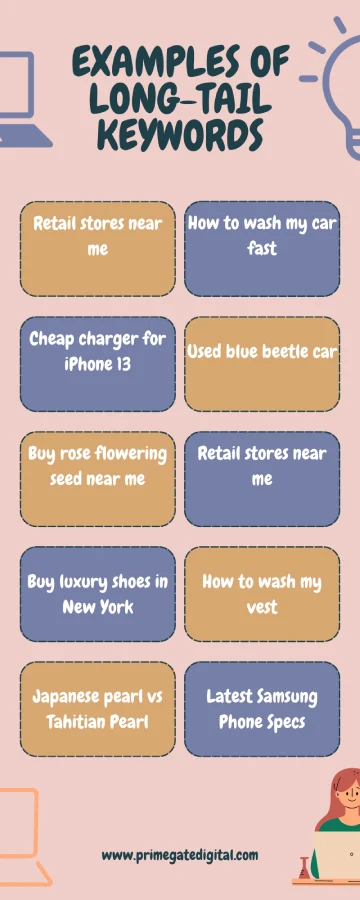Last updated on December 10th, 2023 at 07:33 pm
Keywords are crucial elements of search engine optimization. These are words users input into search engines.
As site owners and SEO professionals, part of our strategy is to ensure we include these keywords on our website to cater to the search interests of our users.

While it isn’t simple enough, keywords can make all the difference in your site’s traffic. Choosing one instead of the other can help you target the right audience and positively impact your search traffic.
Keywords can be more than one word. They can be a phrase or even a short sentence. It all depends on the search intent of your audience and the keyword’s competition level or difficulty, search volume, relevance, and even conversion value.
Keyword length, or the number of words in a keyword, is very important because it relates to the search volume, competition, and conversion value or purchase intent of the searcher.
In short, generic keywords can generate plenty of potential traffic; however, they are highly competitive. For instance, a word like “shoes” will have a high search volume but will have lots of competition
Keywords with longer, more specific words generally have lower search volume. This implies that not many people would search for it compared to short keywords. For instance, “shoes for college students” would have fewer people looking that up.
However, there is a big likelihood that those who use keywords with more than one word are at the buying stage of their customer journey and will likely convert.
Let’s analyze the types of keyword lengths, their pros and cons, and the best time you should add them to your page or content.

One-Word keywords
One-word keywords are simply made up of a single word. They are characterized by high search volume; however, they are very difficult for new businesses to rank for. This is due to their competition level.
Unless you own a prominent brand that consists of a single word or you sell a brandable product, the possibility of competing for this keyword is low. This is because the first page of SERPs for one-word keywords is filled with big online retailers like Amazon.
Examples of one-word keywords
Some examples of one-word keywords include “PPC”, “cream”, “sales”, “dinner”, “dishwashers” and “beach”.
Pros
- One-word keywords have limited benefits, and you will enjoy them if you rank them on the top SERP results.
- But, a one-word keyword is highly effective for prospects, particularly if your industry needs some expertise. For instance, it is effective for electronics, analytical chemistry, medical science, and biopharmaceuticals since one-word keywords directly refer to the product the customer wants.
- Another significant benefit of one-word keywords is that they provide search engines with clear details about your trade, profession, and industry.
Cons
- There are lots of disadvantages of one-word keywords. First and foremost, they are not always successful. They are also highly competitive in spite of their large search volume. And the cost per click is on the high side even though only big companies vie for them.
- Note that one-word keywords won’t get you the leads you need because they are people who are not familiar with your products and their details.
Where to use them
The majority of digital marketing specialists wouldn’t recommend one-word keywords. But you might have to pay attention to a number of them.
An instance is when your brand name is simply one word and you need to rank it. This is because many searchers would visit the first website on the search results page without much thought.
While most experts won’t suggest engaging in a competition, particularly when it comes to the brand name of a competitor, it is a regular occurrence. Particularly if you have the upper hand with a more robust brand than your competitor.

Short-tail keywords
Compared to one-word keywords, short-tail keywords are a bit more specific, not as competitive, and have a low cost per click. Although they have high traffic potential, they are usually seen as a subset of long-tail keywords.
Short-tail keywords are made up of two to three words and are used for broad terms.
Examples of short-tail keywords
Some examples of short-tail keywords include “brand awareness”, “apartment for sales”, “popup tool,” and “television channels.”
Pros
- Short-tail keywords have some smart benefits. Although they are not as broad as one-word keywords, they do have a lot of search volumes. This can be advantageous if you need to drive traffic to your website. Moreover, they are quite simple to identify as you wouldn’t need to analyze a lot of data.
- Secondly, because they have a wide reach, they can’t be restricted to a tight demographic audience. This implies that you won’t have to spend much time researching keywords.
- Thirdly, you can also add them to your content naturally without hassle. You don’t have to be adept in SEO to integrate them into your web pages.
Cons
It also has some disadvantages. A major one is that it is highly competitive. Because they have a wider reach, short-tail keywords are ideal for lead acquisition, and a lot of businesses online would compete for them.
Although finding short-tail keywords is hassle-free, making them work will require plenty of resources and time.
Another disadvantage of short-tail keywords pertains to the nature of the search traffic your website gets. While you get a lot of search visitors, some of them won’t be interested in your services and products.
For instance, if the keyword is “black key”, your site visitor may be checking for your elegantly crafted black key.
Also, it can be a music fan finding information about a band that is not in any way related to your product.
When to use them
- Short-tail keywords are highly important for landing pages and home pages. They are not as wordy as long-tail keywords. Furthermore, they are great for attracting a wider audience, which is particularly crucial for home pages.
- Also, you might want to be specific about your product or services. If not, it will result in confusion, which will negatively affect your bounce rate.
- It’s also smart to add short-tail keywords to header tags and meta descriptions. They simplify the crawling process.

Long-tail keywords
Long-tail keywords are highly specific search queries that searchers input to look for specific products or find solutions to their needs. For instance, this blog content provides a solution to whether keywords have to be more than one word.
Although long-tail keywords do not boast a large volume compared to short-tail keywords, they are characterized by high purchase intent and low competition. This will improve your lead acquisition game.
So, this type of keyword will target customers who are interested and prepared to buy your product or service.
Examples of long-tail keywords
- “Retail stores near me”
- “Buy rose-flowering seed near me.”
- “Used blue beetle car”
- “Cheap charger for iPhone 13”
- “How to wash my car fast”
Pros
- Long-tail keywords have plenty of upsides. As stated, it improves the quality of lead generation, which positively impacts conversion rates. Also, another advantage is that it is not competitive.
- If your website is newly launched without authority, with long-tail keywords, it can succeed with a good rank on the SERPs. Thus, you can combine it with your short-tail keyword initiative, so it can be a two-way gain.
- You will also get access to information about industry trends and the needs of your targeted audience. This can be very valuable when strategizing for new products or even an upgrade of your existing offering.
Cons
- One of the major disadvantages is the difficulty of adding them to your pages. While you can implement them in your header tag structure without much hassle, if you want better results, you have to put in more effort. If you want to rightfully insert your long-tail keywords, you might possibly need to engage an SEO writer.
- Also, it is difficult to identify non-competitive long-tail keywords, particularly those relevant to your business.
- Lastly, their low search volume can help tremendously but can be very difficult. Although there is potential for quality lead acquisition, it will affect your reach and scalability. And it might demand more resources to work.
When to use it
The perfect place to implement long-tail keywords is your blog content. They can be used to attract organic traffic, and long-tail keywords won’t be difficult to insert.
If you have just launched your website and do not have a lot of authority, long-tail keywords can help you rank on Google results pages quickly.
Lastly, with long-tail keywords, you can easily engage with your prospects. People tend to type in long sentences or phrases in the search bar, like they are having a conversation.
Can Keywords Be More Than One Word FAQs
What are the features of a good keyword?
A good keyword has to be relevant, specific, and targeted at your audience to get results. It also has to have a substantial search volume, cater to the search intent of users, and have low competition.
What are keywords with three or more words called?
They are called long-tail keywords. They are characterized by low search volume and high purchase intent.
Can keywords be two words?
Yes, it doesn’t have to be one word. Single words aren’t always ideal. So, it is advisable to utilize two- to three-word phrases.
Conclusion
In this article, we answered the question “Can keywords be more than one word”. We also explored the different types of keywords and how they can add value to your SEO strategy.
 PrimeGate Digital is a Result Driven Blog that strives to go beyond ‘Conventional Digital Marketing’ through digital innovation and performance marketing. We have experience working with world class brands and products.
PrimeGate Digital is a Result Driven Blog that strives to go beyond ‘Conventional Digital Marketing’ through digital innovation and performance marketing. We have experience working with world class brands and products.
